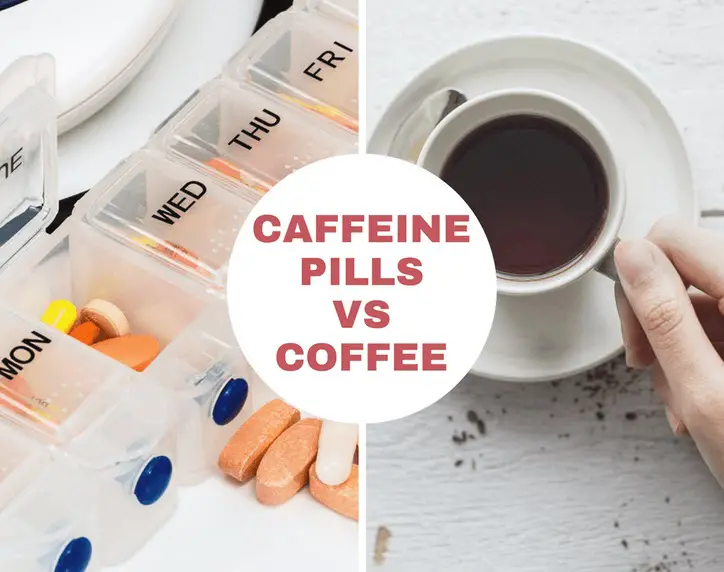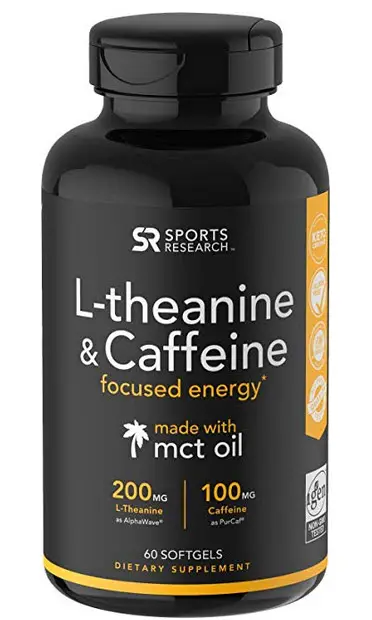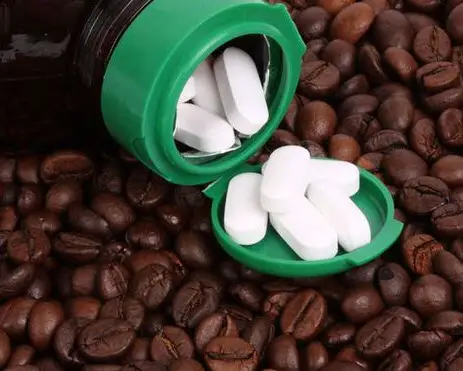Are you ever feeling too tired to get to work? Do you lose focus in the middle of the day? Do you find it difficult to remember things? If only there was a miracle potion that could save you from that… Experienced writers from WritingJobz told us an answer.
Page Table of Contents
- Caffeine- the 101 take
- — Our Pick —
- What’s the story with caffeine pills?
- Why use coffee?
- What are the benefits of caffeine pills?
- Should you worry about anything when drinking coffee?
- What are the risks and side effects when taking caffeine pills?
- Caffeine pills or coffee? What’s our final take?
- FAQs on Caffeine & Caffeine Pills
- Q: Do caffeine pills work?
- Q: What are the typical side effects of caffeine?
- Q: Which people should limit caffeine intake?
- Q: Can you mix caffeine with alcohol?
- Q: Does caffeine affects fertility?
- Q: Can children have caffeine?
- Q: Can seniors take caffeine pills?
- Q: Does caffeine work for hair growth?
- Q: Is it possible for caffeine to cause hair loss?
- Q: Is it better to drink or to apply caffeine for hair growth?
- Q: Is cancer connected to coffee?
- Q: Is caffeine overdose a real thing?
- Q: Can dogs and pets die from caffeine?
- Other posts
Caffeine- the 101 take
Did you know that 90% of the world’s population consumes caffeine one way or another? Caffeine truly is the most popular drug at the moment. It acts as a stimulant upon our central nervous system. We can find it naturally in various plants (cocoa beans, coffee beans and tea leaves) and it’s very easy to find in shops. The prices are very different and can vary from $0.10 a cup up to $2000 for some elite coffees. You can find many different varieties in the shops near you or you can buy it online.
Coffee’s effects on our body are strongest one hour after consumption, but the effects may last up to 6 hours. Not only is caffeine able to improve your alertness and to boost your energy, but it’s also increasing the levels of the neurotransmitter dopamine. This is why we may develop a slight addiction (sooner or later).
Caffeine is also an effective diuretic and helps your body get rid of water through urination. It may lead to dehydration so the side-effects of caffeine should be taken under consideration too: insomnia, anxiousness and headaches.
What’s the story with caffeine pills?
Caffeine pills, on the other hand, are supplements made from caffeine. You can find caffeine pills made with natural caffeine, extracted right in the middle of the brewing process. There are also caffeine pills that contain artificial or synthetic caffeine, so read the label very well.
The amount of caffeine in the caffeine pill is really easy to find out as the manufacturer lists it on the label. Most caffeine pills come in 200miligrams of caffeine per dosage. When it comes to coffee though, the caffeine may vary depending on the serving size and the type of coffee you’re drinking. Typically, an 8-ounce cup of brewed coffee has around 85 milligrams of coffee, but the range is from 65 to 120 milligrams.
Why use coffee?
Even though most people out there simply drink coffee for its taste, the fact that you’re drinking it over a period of time, turning it into a nice habit, is also to be considered. Coffee has health benefits and it also presents anti-cancer abilities. Let’s list some of the most important benefits:
-
It reduces the symptoms of Parkinson’s disease
It seems that drinking coffee is actually helping people with Parkinson’s disease control their movement. In addition, drinking coffee may even lower the risk for developing Parkinson’s disease.
-
It’s good for your liver
People who drink at least one cup of coffee daily are less prone to develop liver cirrhosis later in life. Drinking coffee protects against alcoholic cirrhosis and the more coffee one drinks, the lesser the chance for getting hospitalized/dying of alcoholic cirrhosis.
Coffee may also help one not to develop non-alcoholic fatty liver disease, but it’s going to take around four and even more cups of coffee for preventing the progression of this disease.
-
It’s good for your moral
One study has revealed that drinking four or more cups of coffee is going to make you less depressed, as opposed to people not drinking the famous brew. It’s not the “caffeine high” behind the reason for this effect though, but the antioxidants within its content that keep depression at bay.
It makes sense that drinking two-four cups of coffee may actually lower the risk for suicide in men and women, even by 50%. Coffee helps with the production of neurotransmitters so it works as a mild antidepressant.
-
It makes you better at sports
Drinking a cup of coffee before the workout is going to improve the athletic performance, especially when it comes to endurance sports (cycling or distance running).
-
It’s good for your body’s health
Drinking 3 or more cups of coffee a day is going to keep skin cancer at distance. It may also reduce the risk for developing Type 2 diabetes by 50%.
If you’re older than 65, drinking coffee is going to help you decrease the chances for developing Alzheimer’s disease.
-
It makes you smarter
Not only coffee is keeping you awake, but it also makes you sharper. Coffee helps your brain work faster and more efficiently. If you’re sleep-deprived, taking caffeine is going to improve your attention, vigilance, reaction time and logical reasoning. And they all relate to intelligence.
What are the benefits of caffeine pills?
If you’re determined to keep an eye on your caffeine intake, it’s better to use caffeine pills. They tell you exactly how much caffeine you’re getting. In addition, caffeine pills help you not to develop the yellow teeth that appears in coffee drinkers.
If you don’t really care for the whole drinking coffee ritual, and you simply want to get caffeine into your system, the caffeine pills are the way to go with. Affordable and easy to use, caffeine pills do present plenty of advantages:
- They ease up the headaches
- They give a fast energy boost
- They sharpen mental focus
- They help you stay awake
- They reduce the risk for depression
- They improve the athletic performance
- They reduce the risk for constipation
Caffeine pills help you know exactly how much caffeine you’re getting. They’re cheap, easy to use and they’re easy to throw in your handbag when you’re in a hurry.
Should you worry about anything when drinking coffee?
Even if caffeine is typically safe to consume, it’s important to always remain on the safe side, no matter the source. You don’t want to go with more than 250 milligrams of caffeine on a regular basis.
Too much caffeine may overstimulate or irritate your system. Here are some of the risks of taking too much caffeine:
- Rapid heartbeat
- Dizziness
- Headache
- Irritability
- Insomnia
- High blood pressure
- Pregnancy loss
- Muscle tremors or jitters
- Reduced fertility in both men and women
Note: in case you deal with high blood pressure, chronic headaches, sleep disorders, stomach ulcers, acid reflux or irregular heartbeat, you should stay away from caffeine at all time.
What are the risks and side effects when taking caffeine pills?
Caffeine pills are safe for most people out there and they only pose a risk when taken in high doses. Some people may have to pay attention to their caffeine intake. Here’s when you need to be extra-careful:
- Children and adolescents
- Anyone suffering with caffeine sensitivity
- People with rapid heartbeat or heart diseases
- Pregnant women
- People with hypertension
- Anyone trying to get pregnant (man or woman).
Caffeine pills come in 100 and 200 milligrams of caffeine per serving. This is about the same as a standard cup of brewed coffee.
Taking 400 milligrams daily is safe for most out there. This is the entire caffeine intake for a day. Keep in mind that some foods may also add to your daily caffeine intake. Tea, chocolate bars, protein bars, cola, hot chocolate and energy drinks may also contain caffeine, so make sure you check your intake for the day.
Caffeine pills or coffee? What’s our final take?
It’s easier to overdose on caffeine when you’re going with caffeine pills. The main reason for that is the reality that popping a pill down your throat is a lot easier than drinking several cups of coffee.
But this is one of the differences so check out our final thoughts about the “battle”:
- As coffee is acidic, it may irritate the gastrointestinal tract. It can cause heartburn, especially if you’re a big fan of black coffee. Coffee pills, on the other hand, eliminate the acid. Keep in mind though that the caffeine may still worsen the reflux symptoms in some.
- This may sound unbelievable to the caffeine aficionada, but not everyone likes the taste of coffee. Some only like their coffee with cream and fat, which may not be good for your overall health. The caffeine pills don’t present that risk. This doesn’t eliminate the fact that they also contain other ingredients that are far from being natural.
- Coffee contains many components. The coffee oils may even raise the cholesterol levels, especially when you go with unfiltered coffee (espresso or boiled brews). Caffeine pills don’t contain the coffee oils, but that doesn’t make them risky-free for the body.
- Caffeine has diuretic abilities. Both coffee and caffeine pills may increase urine output. Some feel the need to go to the bathroom more when they’re drinking coffee. This is why caffeine pills may be the better choice for bus drivers, train conductors or other professions that limit your access to toilets.
One last thought
The caffeine pill has no flavor or warmth so turning it into a familiar ritual is impossible. You can never have the same sensory experience with the caffeine pills that you have when drinking coffee.
However, if you’re only for the caffeine and you’re always on the run, using caffeine pills seems to be the better choice. Either way, make sure you always stay on the safe side and you don’t overdo it with either of them. Dealing with caffeine’s addiction and side effects is no picnic at all.
If shopping online for coffee or caffeine pills, make sure that you use coupon codes because that way you can get the price down by up to 50%. You can find many coupons on sites like Savingsforsanity.com. Each store listed there has different coupons that are valid only for a short period of time. Make sure you apply the correct coupon before paying.
FAQs on Caffeine & Caffeine Pills
Q: Do caffeine pills work?
A: As long as you’re staying on the safe side, they most definitely do. Caffeine pills come in affordable packages with a month supply costing as much as a cup of coffee in a shop. One caffeine pill contains as much caffeine as two cups of coffee. It’s essential to take note of how many caffeine pills you make throughout the day since it’s easy to forget when they’re that small.
Q: What are the typical side effects of caffeine?
A: Jitteriness, increased blood pressure and heart rate, concentrating and sleeping problems, and upset stomach are some of the many mild common side effects of caffeine. Keep in mind that caffeine may alter the effects of medications and can lead to severe symptoms when overdosed. Extreme restlessness, frequent urination, flushed face, gastrointestinal distress, high heart rate, and even heart arrhythmia are severe side effects of caffeine overdoes. An overdose can also cause seizures and cardiac arrest.
Q: Which people should limit caffeine intake?
A: As long as you’re playing on the safe side, you shouldn’t stress about the caffeine intake. People with high blood pressure, heart diseases, pregnant women, children and adolescents, and people struggling with GERD (gastroesophageal reflux disease) should avoid caffeine intake. Women trying to get pregnant should stay away from caffeine as well.
Q: Can you mix caffeine with alcohol?
A: Caffeine is a stimulant, making you feel alert and full of energy. On the contrary, alcohol is a depressant, rending you to be sleepier than usual. When you combine a stimulant with a depressant, the stimulant (caffeine in this case) will hide some of the alcohol’s depressant effects. Some people feel even more energetic than you’d feel when only drinking alcohol. Since you don’t feel the alcohol’s results, you may end up drinking a lot more than you typically do. The risk for alcohol poisoning is more significant as well.
Q: Does caffeine affects fertility?
A: We should start by saying that there aren’t many studies, with most of them relying on the memory and honesty of women involved in the study. One study in Denmark revealed that drinking more than 300mg of caffeine does raise the risk of early pregnancy loss, whereas 600mg and more can even lead to miscarriage. However, caffeine had no power (that we know so far) on time a couple needed to conceive naturally. It’s also clear that caffeine doesn’t harm pregnancy rates for couples undergoing fertility treatments.
Q: Can children have caffeine?
A: Ideally, no child under 12 should consume caffeine ever. Even if caffeine doesn’t block a child’s growth, caffeine is still considered to be a drug. Parents should always pay attention to what their child is drinking.
Unfortunately, “energy drinks” have become more and more popular among teenagers under 18. Energy drinks have a great and appealing taste, but they contain caffeine, which remains a potent stimulant.
Q: Can seniors take caffeine pills?
A: It goes without saying that people struggling with anxiety, sleeplessness, increased blood pressures, and low bone strength should use caffeine pills cautiously. With caffeine also found in soda, chocolate, and even some medication, caregivers need to pay attention to all caffeine sources that seniors may have access to. Caffeine pills may lead to dehydration, and the elderly are prone to fluctuations in the amount of fluid in their body. Dehydration may cause even falling, which is why seniors should only take caffeine pills moderately.
Q: Does caffeine work for hair growth?
A: One of the many positive effects of caffeine is that it can encourage hair growth straight from the root. It’s because it works on DHT, a hormone that causes hair loss. Caffeine helps hair cells to produce more “ATP,” which boosts hair growth. Moreover, caffeine can increase blood circulation to the scalp, so healthy hair follicles will grow stronger, healthier, and faster.
Q: Is it possible for caffeine to cause hair loss?
A: Having too much of something (no matter caffeine pills or anything else) can always lead to unpleasant effects. Drinking too much coffee or taking too many caffeine pills leads to several life-threatening effects (scroll up for the risks). The hair growth cycle slowing down is one of them. Stay safe, and don’t overdo it.
Q: Is it better to drink or to apply caffeine for hair growth?
A: Drinking coffee every day isn’t going to give you the Rapunzel hair. Only consuming caffeine (drinking or taking it as caffeine pills) will not make your hair long, healthy, and luscious. You will need to use a hair care routine based on caffeine-formulated hair products and wait for the results to show.
Q: Is cancer connected to coffee?
A: In 2016, extensive research on coffee drinking and cancer risk revealed that the link between the two is “unclassifiable.” What we know so far is that coffee drinking doesn’t lead to pancreas, prostate, nor female breast cancer. However, it can lower the risk of uterine endometrium and even liver cancer. Since smokers tend to be caffeine consumers, it’s challenging to make a difference when studying their impact on risk for cancer.
Q: Is caffeine overdose a real thing?
A: If you’re drinking too much coffee or take too many caffeine pills, you may suffer the side effects. A life-threatening overdose is rare, and we barely can talk about a caffeine overdose causing death. In 2018, 92 reported deaths were caused by caffeine overdose. However, one-third of the number was likely to be suicide. A caffeine overdose may happen when using a dietary supplement or caffeine pills. It may not happen purely from drinking coffee.
Q: Can dogs and pets die from caffeine?
A: Sadly, dogs and cats are quite sensitive to caffeine as opposed to their human parents. If a sip of hot coffee may not be dangerous for most pets, ingesting one or two caffeine pills can kill a cat or a small dog. Symptoms will show half an hour after ingestion and last for 12 hours or so. Many caffeine pills also contain sugar, which may cause inflammation of the pancreas. Pancreatitis is a serious medical condition that can cause death.
The size and health of your pet and the amount of ingested caffeine give the degree of toxicity. A young, large, and healthy puppy has better chances than an old dog dealing with kidney problems. No matter the size and age of your pet, though, remember that caffeine can cause severe damage to kidneys, liver, heart, lungs, and even the central nervous system.


 (4.5 / 5)
(4.5 / 5) (5 / 5)
(5 / 5)






